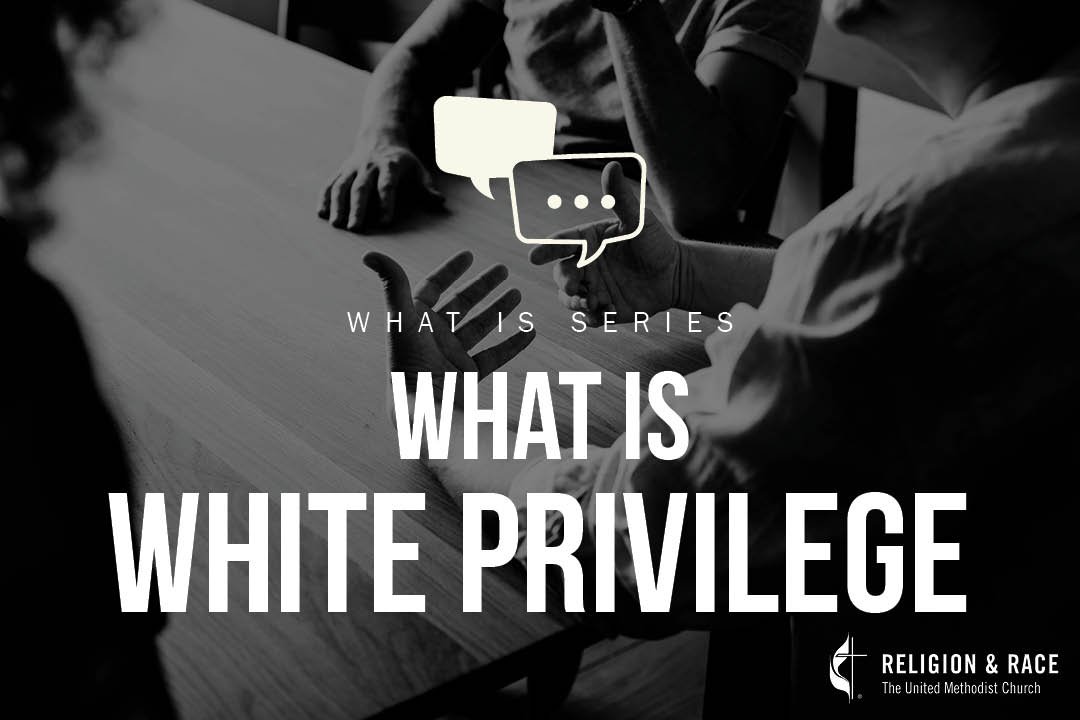What Is White Privilege?
As humanity’s understanding and discussion of the concepts of race, racism, and antiracism have evolved over generations, so have the words and phrases we use as we continue the work of obeying God and advancing racial justice.
In this “What Is?” series, the General Commission on Religion and Race offers this compilation of concise definitions, examples, and Biblical/theological foundations to create common vocabulary for Christians as we engage in anti-racism work.
Our hope, as you engage this series, is that the learning equips you to move into deeper waters in anti-racism work in your respective context.
Visit the series homepage for more information on other anti-racism resources.
Definition:
White privilege is the reality that white people have unearned assets, opportunities, and advantages that are not afforded equally to Black, Indigenous, People of Color, and particularly in the United States, Black Americans.
Recognizing white privilege is critical to transforming systemic racism as it frequently goes unacknowledged and is invisible to the unconscious and undiscerning heart and mind. (See Peggy McIntosh, “White Privilege:Unpacking the Invisible Knapsack,” Peace and Freedom, July/August 1989.)
Example(s) of White Privilege:
As a white person, I can be assured that I will see my race widely represented in the public arena, for example, in political circles, in cultural expressions such as television programming, movies, and advertising, in sports teams, in news reports. I can go shopping by myself without being questioned or followed. I can assume that I will be treated fairly by police officers and financial institutions. I can rent or buy a residence in a neighborhood I can afford without being blocked in doing so and expect to be treated with respect by those who live near me. I can expect to use my credit or debit card, or write a check for a purchase, without being unduly questioned. I can access medical or legal services without fear of rejection or dismissal.
All of these are unearned assets. My white children can equally expect access to schools, stores, businesses, and other institutions without fear of being singled out or interrogated.
-From Rev. Dr. Tanya Linn Bennett
Biblical/Spiritual/Theological Framing or References:
One of the difficulties of addressing white privilege is that much of the theological and Biblical interpretation is grounded in white, western academic culture. Few perspectives from BIPOC scholarship, theological interpretation, histories, cultures, or Biblical reflections are integrated into mainstream public school or Sunday school curricula. White European/U.S. perspectives and norms are viewed as universal, typical, and correct for all people, and those of BIPOC people are seen as “special,” “aberrant,” “culturally specific.”
How would Christian education and preaching change around the world if the church abandoned the idea that Jesus was white, European, and across the world who would teaching and preaching change if to reference and reflect and understanding outside of the dominant white culture would shift our interpretation our primary texts. What would it mean to consider the encounter between Jesus and the Syrophoenician woman (a woman of darker skin who isn’t even named in this narrative) through the lens of white privilege. During Jesus’ time, Jewish people considered Hebrew culture superior to other minoritized cultures such as the Samaritan and Syrophoenician people.
Reflection Questions:
Consider the encounters you experienced today. Which ones went well or were satisfying? Which ones had weaker or less satisfying outcomes? What factors do you think influenced the results of these encounters? In what ways might the color of your skin have been a factor?
How often are you in a workspace, classroom, church congregation, medical office, or other public spaces where most people look like you/share your race? In what ways can we explain that phenomenon?
What would it mean to consciously examine our everyday experience and name those places and spaces where white privilege is evident?In what ways would this shift our behavior and self-understanding?
Additional Resources:
Howard Thurman, “Jesus and the Disinherited.”
Mahzarin R. Banaji and Anthony G. Greenwald, “Blindspot: Hidden Biases of Good People.”
Thandeka, “Learning to Be White: Money, Race and God in America.”

